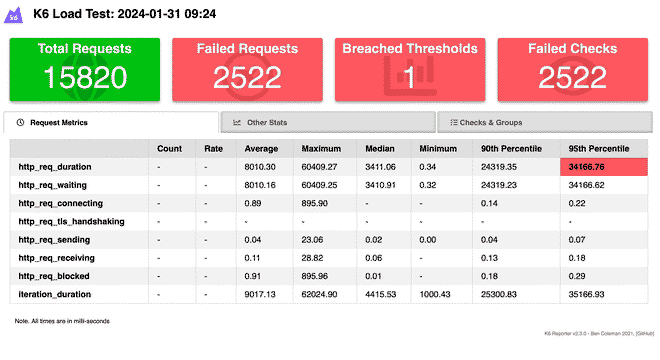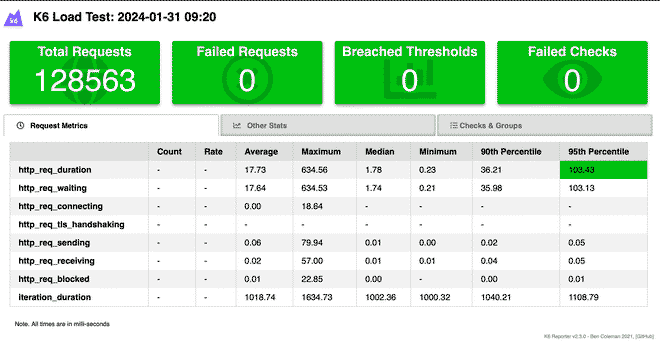Backbone for the 2024 NCKU Bike Festival, featuring event notifications and Line Login for authentication. Built with Go, Docker, and Redis.
DB Schema#
User Table#
| Field | Type | GORM Options | JSON Key | Description |
|---|---|---|---|---|
| ID | string | type:varchar(36);primary_key | id | The unique identifier for the user. (from line account) |
| Name | string | type:varchar(255);index | name | The name of the user. (from line account) |
User-Event Table#
| Field | Type | Description |
|---|---|---|
| user_id | varchar(36) | The ID of the user, linking to User.ID. |
| event_id | varchar(36) | The ID of the event, linking to Event.ID. |
Event Table#
| Field | Type | GORM Options | JSON Key | Redis Key | Description |
|---|---|---|---|---|---|
| ID | *string | type:varchar(36);primary_key | id | id | The event ID defined at the frontend. If not provided, it is calculated by the hash of event detail and event time. |
| EventTimeStart | *time.Time | type:timestamp | event_time_start | event_time_start | The start time of the event. |
| EventTimeEnd | *time.Time | type:timestamp | event_time_end | event_time_end | The end time of the event. |
| EventDetail | *string | type:varchar(1024) | event_detail | event_detail | The details of the event, stored in JSON format. This is parsed when sending to the line message API. |
心理測驗統計#
- 結果種類儲存
- 統計趴數
| Field | Type | GORM Options | Description |
|---|---|---|---|
| Type | string | type:varchar(255);unique | The unique type of the psycho test. |
| Count | int | type:int | The count associated with the test. |
API#
- Add type
- Retrieve statistic result
Line#
Official Document#
Tutorial#
Line Login Integration Tutorial
Push Line Flex Message#
- bike-festival-2024-backend/pkg/worker/event.go at main · gdsc-ncku/bike-festival-2024-backend (github.com)
- bike-festival-2024-backend/pkg/line_utils/flex.go at main · gdsc-ncku/bike-festival-2024-backend (github.com)
Asynq#
- hibiken/asynq: Simple, reliable, and efficient distributed task queue in Go (github.com)
- hibiken/asynqmon: Web UI for Asynq task queue (github.com)
Add Scheduled Task#
Cancel Scheduled Task#
- asynq/inspector.go at master · hibiken/asynq (github.com)
- bike-festival-2024-backend/pkg/service/notify.go at main · gdsc-ncku/bike-festival-2024-backend (github.com)
Optimization#
Get Event By EventID#
DB only#
(2000 virtual users, for 1 mins)

Redis Cache + DB#
(2000 virtual users, for 1 mins)

type EventCache struct {
ID string `json:"id" redis:"id"`
EventTimeStart time.Time `json:"event_time_start" redis:"event_time_start"`
EventTimeEnd time.Time `json:"event_time_end" redis:"event_time_end"`
EventDetail string `json:"event_detail" redis:"event_detail"`
CreatedAt time.Time `json:"created_at" redis:"created_at"`
UpdatedAt time.Time `json:"updated_at" redis:"updated_at"`
}
部署#
Nginx Setup#
Nginx Reverse Proxy
[!note]
要把
ssl_certificate & ssl_certificate_key那邊的 domain 改成你自己的 (for Certbot)
server {
listen 443 ssl http2;
listen [::]:443 ssl http2;
server_name nckubikefestival.ncku.edu.tw;
ssl_certificate /etc/letsencrypt/live/nckubikefestival.ncku.edu.tw/fullchain.pem; # managed by Certbot
ssl_certificate_key /etc/letsencrypt/live/nckubikefestival.ncku.edu.tw/privkey.pem; # managed by Certbot
ssl_ecdh_curve X25519:secp384r1;
ssl_session_cache shared:SSL:50m;
ssl_session_timeout 1440m;
ssl_session_tickets off;
ssl_protocols TLSv1.2 TLSv1.3;
ssl_ciphers TLS13-AES-256-GCM-SHA384:TLS13-CHACHA20-POLY1305-SHA256:TLS13-AES-128-GCM-SHA256:TLS13-AES-128-CCM-8-SHA256:TLS13-AES-128-CCM-SHA256:EECDH+CHACHA20:EECDH+CHACHA20-draft:EECDH+ECDSA+AES128:EECDH+aRSA+AES128:RSA+AES128:EECDH+ECDSA+AES256:EECDH+aRSA+AES256:RSA+AES256:EECDH+ECDSA+3DES:EECDH+aRSA+3DES:RSA+3DES:!MD5;
ssl_prefer_server_ciphers on;
ssl_stapling on;
ssl_stapling_verify on;
ssl_trusted_certificate /etc/letsencrypt/live/nckubikefestival.ncku.edu.tw/chain.pem;
add_header Strict-Transport-Security "max-age=31536000; preload";
# Forward https://nckubikefestival.ncku.edu.tw/api/<path> to http://localhost:8000/<path>
# For Golang Backend
location /api/ {
proxy_pass http://localhost:8000/;
proxy_set_header Host $host;
proxy_set_header X-Real-IP $remote_addr;
proxy_set_header X-Forwarded-For $proxy_add_x_forwarded_for;
proxy_set_header X-Forwarded-Proto $scheme;
}
# Forward https://nckubikefestival.ncku.edu.tw/* to http://localhost:5173/*
# For Vue Frontend
location / {
proxy_pass http://localhost:5173/;
proxy_set_header Host $host;
proxy_set_header X-Real-IP $remote_addr;
proxy_set_header X-Forwarded-For $proxy_add_x_forwarded_for;
proxy_set_header X-Forwarded-Proto $scheme;
}
}
CertBot#
sudo apt install certbot
sudo apt-get install python3-certbot-nginx
# 申請憑證
sudo certbot --nginx --email peterxcli@gmail.com --agree-tos -d nckubikefestival.ncku.edu.tw
# 安裝憑證 ( cert-name 要跟 nginx的 config 檔的 server_name 一樣)
sudo certbot install --cert-name nckubikefestival.ncku.edu.tw
Bug#
Line login redirect#
[!warning] the bug is due to the
referer-policythe default policy isstrict-origin-when-cross-originIn my case, I use the additional redirect_path(which is set in query string ``) to compose the frontend redirect path:
It works fine when I am developing at my local computer, but in the production environment, it always redirect user to the page with duplicate path, like:
/bikefest/main-stagebikefest/main-stage/Then I discover that in my local development environment, the request referer only contain the domain name(
localhost:5173), but the production send its full path and query string to the backend server.And that the reason is: in dev env, the frontend is at
localhost:5173and the backend is atlocalhost:8000, the trigger the default referer policystrict-origin-when-cross-originonly send thelocalhost:8000as the referer value. In prod env, the frontend and backend have the same domain but only differ at the path, so the refer default policy sendorigin,path,queryas the referer value, and frontend also send itswindows.location.pathasredirected_pathquery string, then backend compose thereferer,redirect_path, and the result would be like `https:///windows.location.path/windows.location.path. And that is the main reason why the production appear the page with duplicate path. To resolve this problem, we only needs to set the referer policy in the nginx configuration, and let the referer only include
originto prevent the above issue:server { ... # Set the Referrer-Policy header add_header Referrer-Policy "origin"; ... }
